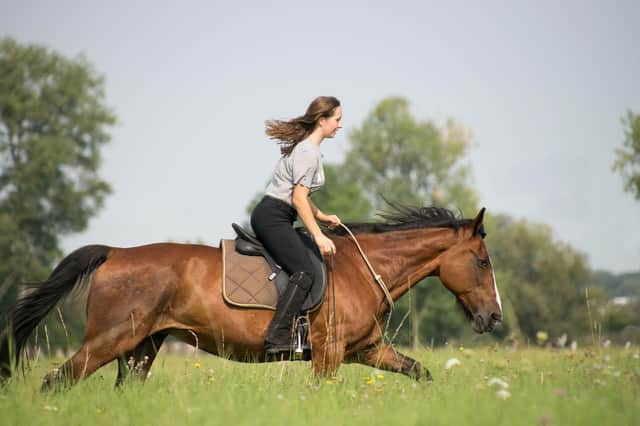FARMING: Getting your horse fit for competitions


On the equine side of things, it is also looking like competitions will be restarting soon, so our clients are busy getting their horses fit and ready to go! Getting horses fit after periods of rest can be difficult, as it can for us!
Horses require any increase in workload to take place over several weeks to ensure that their muscles and cardiovascular system have time to adapt to the increased work, as this helps to prevent injury and fatigue. Assuming the horse is not returning from an injury, starting with hacking and some roadwork is sensible, gradually increasing the duration and speed of exercise. Over time, schooling and jumping work can be introduced depending on the ultimate goal for the horse. There are several fitness programmes you can find online if you need a fitness plan to follow.
Advertisement
Hide AdAdvertisement
Hide AdOther activities which can be helpful to increase fitness in horses include hill work, lunging, long-reining and interval work. These all have their place as part of a fitness programme, but none of these can be the sole method used to get a horse fit.
In addition to making sure horses get fit ready for the competition season, there are several things we should be making sure have been covered from a veterinary perspective. Horses need to meet the vaccination requirements of the competition authority under which they compete. Broadly speaking all horses will need to be vaccinated for equine influenza, often within roughly six months of the date of competition. Most horses we see are also vaccinated for tetanus, although this is not a competition requirement.
Some owners also chose to vaccinate their horses for equine herpesvirus, especially given the recent outbreak in Europe
This outbreak has seen horses display the rarer neurological form of herpesvirus, for which the vaccination manufacturers make no claim to prevent.
Advertisement
Hide AdAdvertisement
Hide AdThe vaccination is normally used to prevent the respiratory form of the disease, as well as to prevent abortion in pregnant mares. The vaccination is given every six months to prevent respiratory disease, and during months five, seven and nine of pregnancy to prevent abortion. There is currently very high demand for this vaccine so please contact your vet .
Additionally, many riders decide to get their horses teeth checked prior to the competition season, as well as ensuring there are no lameness or other performance limiting issues present. It is also important for riders to make sure all of their memberships and registrations are up to date to ensure they are still eligible to compete!